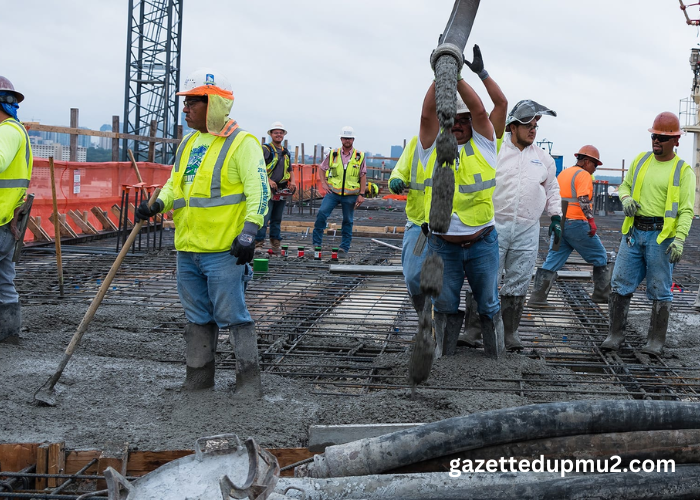Concrete is the unsung hero of the commercial landscape in Dallas. From the imposing foundations of skyscrapers to the vast expanse of parking lots, concrete provides the sturdy framework that supports the city’s economic engine. However, the process of installing concrete is a complex endeavor that requires expertise, precision, and attention to detail. This comprehensive guide will walk you through the commercial concrete installation process, from initial site preparation to the final finishing touches.
The Commercial Concrete Installation Process: A Deeper Dive
Site Preparation: Laying the Groundwork
A successful concrete project begins with a solid foundation, both literally and figuratively. This involves a meticulous process of site preparation:
- Topographic survey: Creating a detailed map of the site’s contours and elevations.
- Soil testing: Analyzing the soil’s composition to determine its load-bearing capacity and drainage properties.
- Utility location: Identifying underground pipes, cables, and other utilities to prevent damage during construction.
- Excavation: Removing existing structures, vegetation, and topsoil to prepare the ground for the concrete base.
- Subbase installation: Laying a compacted layer of gravel or crushed stone to provide drainage and support.
Formwork: Shaping the Future
Formwork is the temporary mold that gives concrete its shape. It’s a crucial element that directly impacts the final appearance and structural integrity of the concrete. Key considerations include:
- Form material selection: Choosing the appropriate material (wood, metal, or plastic) based on project requirements.
- Form design and assembly: Creating precise forms that align with the project’s blueprint.
- Reinforcement placement: Installing rebar or wire mesh within the forms to enhance concrete strength.
- Waterproofing measures: Implementing measures to protect the concrete from moisture damage.
Concrete Mixing and Delivery
The Perfect Recipe The quality of concrete is heavily dependent on the precise proportions of its components: cement, water, aggregate, and admixtures. Concrete is typically mixed at a ready-mix plant and delivered to the site in specialized trucks.
- Mix design: Determining the optimal concrete mix based on strength, durability, and workability requirements.
- Quality control: Rigorous testing to ensure the concrete meets specified standards.
- Timely delivery: Coordinating concrete delivery to match the pouring schedule.
Concrete Placement and Consolidation
Pouring Perfection The art of pouring concrete involves a delicate balance of speed and precision. Contractors use various techniques to ensure proper placement and consolidation:
- Pumping: Transporting concrete to elevated areas using concrete pumps.
- Hand shoveling: Manually placing concrete in smaller areas or for finishing work.
- Vibration: Using vibrating equipment to eliminate air pockets and achieve optimal compaction.
Concrete Finishing: Creating the Perfect Surface
The finishing process turns the freshly poured concrete into a usable and aesthetically pleasing surface. Common finishing techniques include:
- Floating: Smoothing the concrete surface with a wooden float.
- Troweling: Creating a smooth, hard finish using a steel trowel.
- Broaching: Texturing the surface for slip resistance.
- Stamping: Imprinting patterns onto the concrete for decorative purposes.
- Coloring: Adding pigments to the concrete mix or applying stains for aesthetic appeal.
- Joint cutting: Creating controlled joints to prevent random cracking.
Curing: The Path to Strength
Curing is the critical process of allowing concrete to harden and gain strength. It involves:
- Moisture retention: Keeping the concrete moist to prevent premature drying.
- Temperature control: Protecting the concrete from extreme temperature fluctuations.
- Curing time: Allowing sufficient time for the concrete to reach its design strength.
Common Commercial Concrete Projects in Dallas
Dallas’s thriving commercial landscape demands a variety of concrete applications. Some common projects include:
- Retail centers: Parking lots, sidewalks, loading docks, and building foundations.
- Office buildings: Foundations, slabs, stairs, and exterior paving.
- Industrial facilities: Warehouse floors, loading docks, and exterior pads.
- Hospitality venues: Driveways, walkways, patios, and pool decks.
Each project presents unique challenges and requires specialized expertise. Working with experienced commercial concrete contractors Dallas TX is essential to ensure the success of these projects.
The Importance of Quality Concrete Work
Investing in high-quality concrete is a strategic decision that yields substantial benefits for Dallas businesses. Beyond its aesthetic appeal, concrete is the backbone of commercial structures, providing the foundation for safety, durability, and long-term value.
A well-executed concrete project ensures longevity, often lasting decades with minimal upkeep. This translates to significant cost savings on repairs and replacements, allowing businesses to allocate resources more efficiently. Moreover, concrete’s exceptional strength and resistance to wear and tear guarantee uninterrupted operations, minimizing downtime due to structural issues.
Safety is paramount in any commercial setting. Quality concrete, with features like slip-resistant finishes and even surfaces, contributes to a secure environment for employees, customers, and visitors. Additionally, a visually appealing concrete installation can enhance a property’s curb appeal, potentially attracting more customers and increasing its overall value.
Ultimately, the choice of high-quality concrete is an investment in a business’s future. It’s a decision that prioritizes safety, durability, and aesthetics, all of which contribute to a positive and prosperous business environment.
Conclusion
By understanding the intricacies of the commercial concrete process, Dallas businesses can make informed decisions to create durable, functional, and visually appealing concrete surfaces. From careful site preparation to expert finishing, each step contributes to the overall success of the project. Investing in high-quality concrete is not just an expense; it’s an investment in the long-term health and prosperity of your business. By partnering with experienced commercial concrete contractors Dallas TX, you can ensure that your concrete project meets the highest standards of quality and performance.





